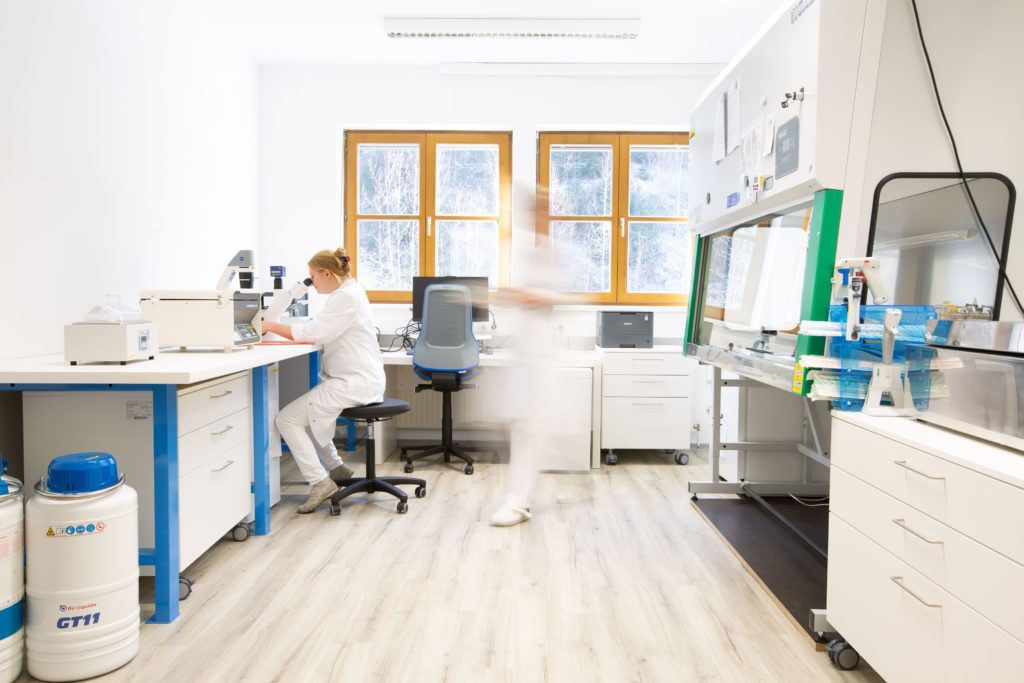
One of the industries in which this impact was and still is most noticeable is the life sciences industry. Especially the strong diagnostic sector in Salzburg has received a further boost. Georg Bauer, Managing Director at STRATEC Consumables in Anif confirms this, but adds: “The high does not necessarily have to remain that way.” In his opinion, only a few of the diagnostic systems launched on the market in the short term will survive in the long term.
Switching to and developing test evaluations
Despite everything, the importance of diagnostics as a whole has increased. STRATEC Consumables itself is also part of a diagnostic development called Simoa®, which allows for evaluation through blood in addition to saliva or nasal swabs. This not only provides information on the presence or absence of an infection, but also on how serious it can become. A microstructured plastic disc is required for these evaluations, which is developed and manufactured in Salzburg. The device into which the disc is inserted as a sample carrier is developed by the parent company in Germany.
Also included in diagnostics are the evaluations of the many necessary Covid tests. The often-mentioned PCR test describes a specific technology that can be used for detecting genetic diseases as well as discovering virus infections. Before the pandemic, Novogenia, a company in Eugendorf, specialized in human genetic tests. Because the company can produce and evaluate such PCR tests, it entered the market. Today, with capacities of up to 1.2 million pooling tests per day, Novogenia operates one of the largest laboratories in Austria.
Fast tests made in Salzburg
Procomcure, a company in Thalgau, focuses on Covid rapid tests. All key components for gargle and saliva tests are developed and manufactured in-house. The capacities are sufficient for up to 10 million tests per week. In addition to the public sector, the industry, especially the food industry, is one of the main buyers. In December 2020, the company was able to open its own diagnostic laboratory for analyses in Bergheim.
Essential quality testing
Testing also takes place at the Bischofshofen-based company HygCen. The 25 employees test medical products, disinfectants, or protective equipment for their quality. These testing procedures are mandatory for such products, professional manufacturers know that. With the onset of the pandemic and the increased demand for masks and disinfectants, these manufacturers have produced more, and more and more people from other industries have entered production. “As a result, our order volume has doubled,” confirms the deputy technical director Monika Feltgen.
Digital services as winners of the crisis
The development idea for hotelkit came from another direction in the city of Salzburg. Their product, medikit, is a digital communication platform that can be used to organize clinical everyday life. This is because shift work, employee turnover, complex IT infrastructure, and much more make it difficult to manage. During the pandemic, the Salzburg state hospitals used the software for capacity monitoring for Covid beds at all locations. Through this idea and the already existing possibilities for digital collaborative work, the company was able to benefit economically. Also because digital services experienced a particular upswing in the crisis: “Decision-makers were called upon to recognize the digital possibilities and leave the analog comfort zone more often. That helped us a lot,” confirms medikit co-founder Johannes Gebauer.
Funding as innovation support
When it comes to innovation, funding can be a significant support. For example, Novogenia was able to develop new software and technology with an FFG grant. This enabled them to modify the robots used in production to be independent of the scarce original materials. PharmGenetix from Anif is also developing a biomarker test with FFG funding. This allows for disease diagnosis and provides an analysis to estimate medication tolerance.
All of these companies once again show that “crisis” – at least economically – does not apply to every area. They also show that through innovative ideas, they can not only become even better but also make a significant contribution to coping with the pandemic.
This might also interest you
6. March 2025
salz21: Necessary Steps for the Future
On March 5, 2025, salz21 | Home of Innovation once again provided a platform for future topics, innovations, and interdisciplinary exchange. More than 1,000 visitors took the opportunity to learn about current developments and discuss perspectives for tomorrow. Three topics were particularly dominant: climate protection, artificial intelligence, and a strong Europe.
25. September 2024
Green Deal: How Sustainable Business Development Can Look
The EU aims to create political and legal frameworks through the Green Deal to transform both the economy and society in a sustainable way. The Pinzgau-based company Design Composite demonstrates how this can be implemented.
15. August 2024
Sunbeam Yachts: Where Craftsmanship Meets Digitalization
Sunbeam Yachts has been building exclusive sailing yachts at Mattsee for generations. The production is done by hand, with some processes now digitally supported.
12. August 2024
SBS: One Software for Many Self-Service Devices
As a leading provider of banking software in Salzburg, SBS is now exploring new markets. The company remains true to its core segment by offering manufacturer-neutral software for self-service devices in additional sectors.